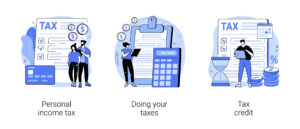How to Save Money on Your Social Security Taxes

Most people look forward to the day when they start to receive the rewards for putting all their hard-earned money over the years into social security. However, some people end up with a lot less than they had planned on because they end up paying more taxes on those benefits than they had expected. So what can you do to help lower the tax bill on your Social Security benefits?
For starters you need to know what tax table you fall into. It all depends on how much provisional income you make, which is determined by adding your adjusted gross income, your nontaxable interest and half of your Social Security benefits. If you earn less than $25,000 as a single or $32,000 for a joint return then you won’t have to pay taxes on your SS benefits.
However, as much as 50 percent of your benefits could be taxable if your provisional income is between $25,000 and $34,000 for singles and $32,000 and $44,000 for joint filers. If you surpass those figures as much as 85 percent of your benefits could be taxed.
So in order to avoid these taxes you have a few options. You can give as much as $100,000 tax free a year to charity from an IRA if you are 70.5 years or older. You can also put as much as $125,000 into a Qualified longevity Annuity Contract (QLAC). This amount does not count against you when your required minimum distribution is calculated.
Another move you can make is to withdraw money from a tax-free Roth IRA or you can roll money over from a traditional IRA to a Roth many years before you start collecting SS benefits, which will help you reduce taxes in retirement. Of course, for high net worth individuals it might be very difficult to get below the 85 percent threshold, which is why it’s important to have an overall tax-efficiency plan instead of simply focusing on saving on Social Security taxes.
http://www.kiplinger.com/article/retirement/T051-C001-S003-how-to-limit-taxes-on-social-security-benefits.html
Income the IRS Can’t Touch
Income the IRS Can’t Touch There’s one readily available and legal source of untaxed income that we know of: municipal bonds. These securities are issued by state and local governments, school districts, hospitals and other public agencies to support community projects and services. To permit these worthy endeavors to raise money economically, Uncle Sam exempts…
Avoiding Real Estate Tax Revaluations
Avoiding Real Estate Tax Revaluations by Steven Singer, CPA As a result of the passage of Proposition 13 almost thirty years ago, real estate owners currently enjoy paying property taxes based on the property’s purchase price, value of improvements and an annual increase of 2% over the previous years’ assessed value. As a result of…
Annuities in Qualified Retirement Plans
Annuities in Qualified Retirement Plans By Russell Hill Using annuities in qualified retirement plans. Qualified annuities reduce your current taxable salary in addition to accumulating tax deferred earnings, when you contribute money to an annuities program through an employer (as one of the investment options in a salary reduction retirement plan). Those who work for…
Paying Too Much In Taxes?
Paying Too Much In Taxes? By Theodore Lanzaro Now that the end of the year is near, it is time to review a few business tax tips for 2008. Anyone who owns a business or is planning to start a new business in 2008 should be thinking about maximizing the profitability of their business and…


